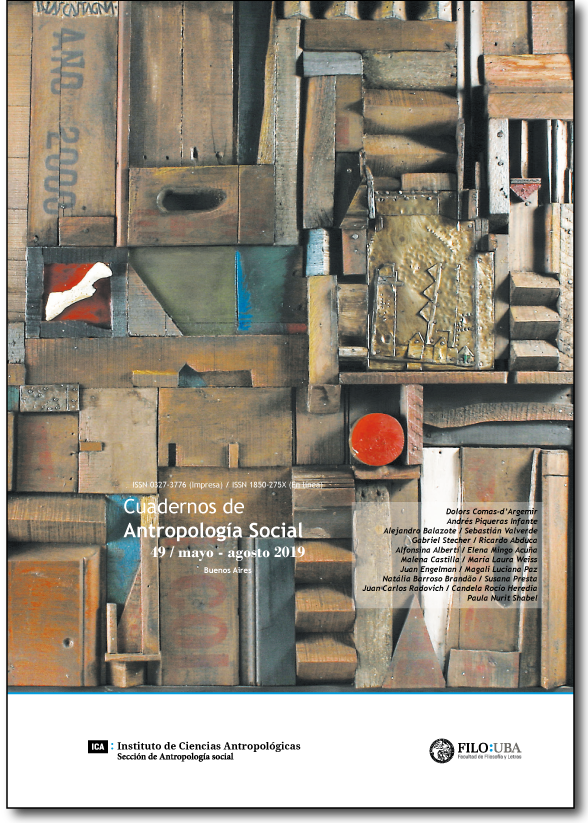Signifier as an economic category. (Toward a linguistic concept of use-value).
Abstract
The article examines the use of the term “use value” in various contemporary works of economic anthropology, finding that the expression is used in three different ways. I maintain that these three meanings are but partial approximations to a description concerning the functioning of the values that emerge from use: the material entities from which human society is built. I argue that this triple manifestation corresponds exactly with the discovery that, since 1950, founded structuralism: the autonomy of the symbolic, as a specific register, although linked to the imaginary and the real. The attributes of the use value concept here proposed suggest notorious parallelism with that of signifier: its arbitrariness and indifference, its qualitative character, versatility, and capability to form signifying chains. From this perspective certain obvious contemporary phenomena are outlined, such as the fact that goods we use nowadays actually have an inscription, while in the distant past only the money had inscriptions.Downloads
References
Abduca, R. (2004). ¿Qué es un valor de uso? Producción, significante, enunciación. El
Ojo Mocho, Revista de Crítica Política y Cultural, nº 18-19, 39-43.
» Abduca, R. (2005). Consumo y subjetividad: el valor de uso como significante. Etnia, nº
-47, 7-26.
» Abduca, R. (2010). Acerca del concepto de valor de uso: signo, consumo y subjetividad. La
hoja de coca en la Argentina. (tesis de doctorado), Universidad de Buenos Aires, Facultad
de Filosofía y Letras, Ciudad Autónoma de Buenos Aires, Argentina.
» Abduca, R. (2018). Valeur d’usage et signifiant. Notes pour une théorie unifiée. Actuel
Marx, 64, 146-161.
» Althusser, L. (1993 [1966]). Trois notes sur la théorie des discours. En Écrits sur la psychanalyse: Freud et Lacan (pp. 111-170). Paris: Stock/IMEC.
» Aristóteles (1959). Politics. Edic. bilingüe. London: Heinemann, Loeb Classical Library.
» Balibar, É. (1995). The Philosophy of Marx. London: Verso.
» Baudrillard, J. (1972). Pour une critique de l’économie politique du signe. Paris: Gallimard.
» Bently, L. (2008). The Making of Modern Trade Marks Law: The Construction of the Legal
Concept of Trade Mark (1860-80). En L. Bently, J. Davis y J. C. Ginsburg, Trade Marks and
Brands (pp. 3-41). Cambridge: Cambridge University Press.
» Chevalier, J. (1982). Civilization and the Stolen Gift: Capital, Kin, and Cult In Eastern Peru.
Toronto: University of Toronto Press.
» Fine, B. (2008). The World of Consumption. The Material and Cultural Revisited. London:
Routledge.
» Goux, J.-J. (1973) [orig. 1969]. Los equivalentes generales en el marxismo y el psicoanálisis.
Buenos Aires: Caldén.
» Graeber, D. (2011). Debt. The First 5000 Years. New York: Melville.
» Gregory, C. A. (1982). Gifts and Commodities. London, Academic Press.
» Gregory, C. A. (1997). Savage Money. The Anthropology and Politics of Commodity Exchange. Amsterdam: Harwood.
» Hahn, C. y Hart, K. (2011). Economic Anthropology. History, Ethnography, Critique. Cambridge: Polity.
» Hamilton, G-G. y Chi-Kong Lai (1989). Consumerism without Capitalism. Consumption
and Brand Names in Late Imperial China. En H. J. Rutz y B. S. Orlove, The Social Economy
of Consumption (pp. 253-280). Lanham: University Press of America.
» Herrenschmidt, C. (2007). Les trois écritures. Langue, signe, code. Paris: Gallimard.
» Jevons, W. S. (2013). The Theory of Political Economy. New York: Palgrave-Macmillan.
» Lacan, J. (1966a). Le séminaire sur «La Lettre-voIée». En Écrits, (pp. 11-61), Paris: Seuíl.
» Lacan, J. (1966b). L’instance de la lettre dans l’inconscient, ou la raison depuis Freud. En
Écrits, (pp. 493-598), Paris: Seuíl.
» Lévi-Strauss, C. (1977). Apéndice de los capítulos III y IV. En Antropología estructural (pp.
-88). Buenos Aires: Eudeba.
Lévi-Strauss, C. (1980). “Introduction a l’œuvre de Marcel Mauss”. M. Mauss, Sociologie
et anthropologie (pp. ix-lii). Paris: P.U.F.
» Lévi-Strauss, C. (2013). Œuvres. Paris: Gallimard, Bibliothèque de la Pléiade.
» Marx, K. (1962). Das Kapital. Libro I; Marx-Engels Werke, t. 23, Berlin: Dietz.
» Marx, K. (1971a). Elementos fundamentales para la crítica de la economía política (Grundrisse)
-1858 (vols. 1-3), Buenos Aires: Siglo XXI
» Marx, K. (1971b). “Fragmento de la versión primitiva de la ‘Contribución a la crítica de
la economía política”. Elementos fundamentales para la crítica de la economía política
(Grundrisse) 1857-1858 (vol. 3, pp. 119-218). Buenos Aires: Siglo XXI.
» Marx, K. (1976). Grundrisse der Kritik der politischen Ökonomie; Ökonomische Manuskripte
und Schriften 1858-1861. MEGA, 2º Abteilung, t. 1; Berlin: Dietz.
» Marx, K. (1980a). “Urtext «Zur Kritik»”, Ökonomische Manuskripte und Schriften 1858-1861,
(pp. 17-94). MEGA, 2º Abteilung, t. 2; Berlin: Dietz.
» Marx, K. (1980b). Contribución a la crítica de la economía política. México: S. XXI.
» Marx, K. (1980c). Zur Kritik der Politischen Ökonomie. Ökonomische Manuskripte und Schriften 1858-1861, (pp. 95-245). MEGA, 2º Abteilung, t. 2; Berlin: Dietz.
» Marx, K. (1981). El capital. Tomo I / Libro primero (vols. 1-3). México: Siglo XXI.
» Menger, C., (1996). Principios de economía política. Barcelona: Folio.
» Narotzky, S. (1997). New Directions of Economic Anthropology. London: Pluto.
» Ricardo, D. (2004). On the Principles of Political Economy and Taxation. (Ed. Sraffa-Dobb).
Indianapolis: Liberty Fund.
» Robotham, D. (2005). Political Economy. En J. Carrier (ed.), Handbook of Economic Anthropology (pp. 41-58). Cheltenham: Elgar.
» Roseberry, W. (1993). Anthropologies and Histories. London: Routledge.
» Sahlins, M. (1972). Stone Age Economics. Chicago: Aldine.
» Saussure, F. de (1993). Troisième cours de linguistique générale (1910-11) d’après les cahiers
d’Émile Constantin. Edic. de E. Komatsu. Oxford: Pergamon.
» Saussure, F. de (1997). Cours de linguistique générale. Edic. de T. de Mauro. Paris: Payot.
» Taussig, M. (1980). The Devil and Commodity Fetishism in South America. Chapel Hill: University of Carolina Press.

Esta obra está bajo una Licencia Creative Commons Atribución 4.0 Internacional
Cuadernos de Antropología Social sostiene su compromiso con las políticas de Acceso Abierto a la información científica, al considerar que tanto las publicaciones científicas como las investigaciones financiadas con fondos públicos deben circular en Internet en forma libre, gratuita y sin restricciones.
Los contenidos y opiniones expresadas en los artículos publicados son de entera responsabilidad de sus autores.
Los autores/as que publiquen en esta revista aceptan las siguientes condiciones:
- Los autores/as conservan los derechos de autor y ceden a la revista el derecho de la primera publicación, bajo la licencia de atribución de Creative Commons, que permite a terceros utilizar lo publicado siempre que mencionen la autoría del trabajo y a la primera publicación en esta revista.
- Los autores/as pueden realizar otros acuerdos contractuales independientes y adicionales para la distribución no exclusiva de la versión del artículo publicado en esta revista (p. ej., incluirlo en un repositorio institucional o publicarlo en un libro) siempre que indiquen claramente que el trabajo se publicó por primera vez en esta revista.















